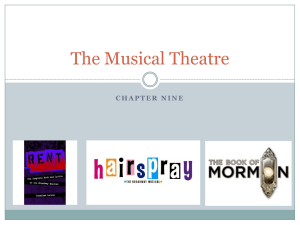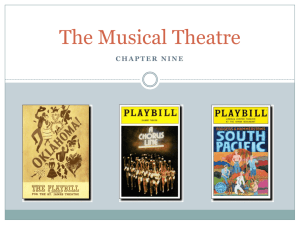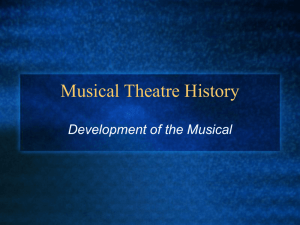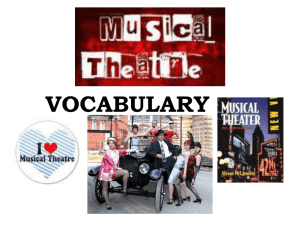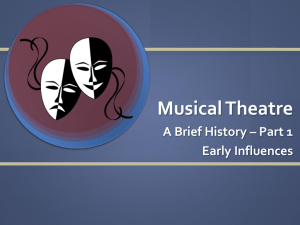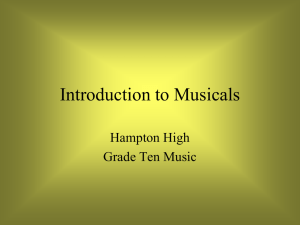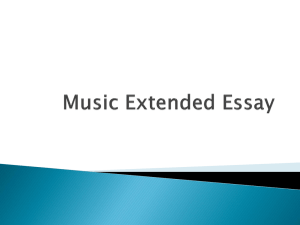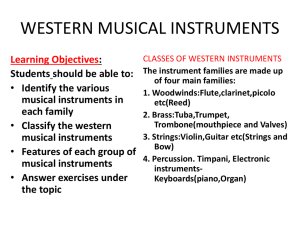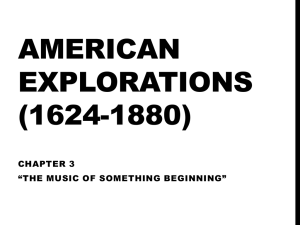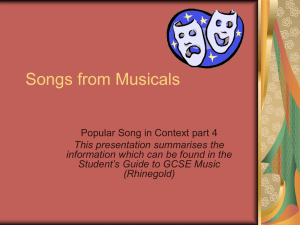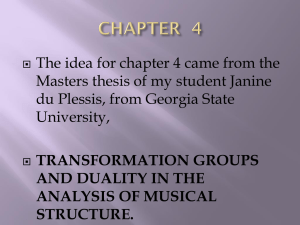Chapter nine
advertisement
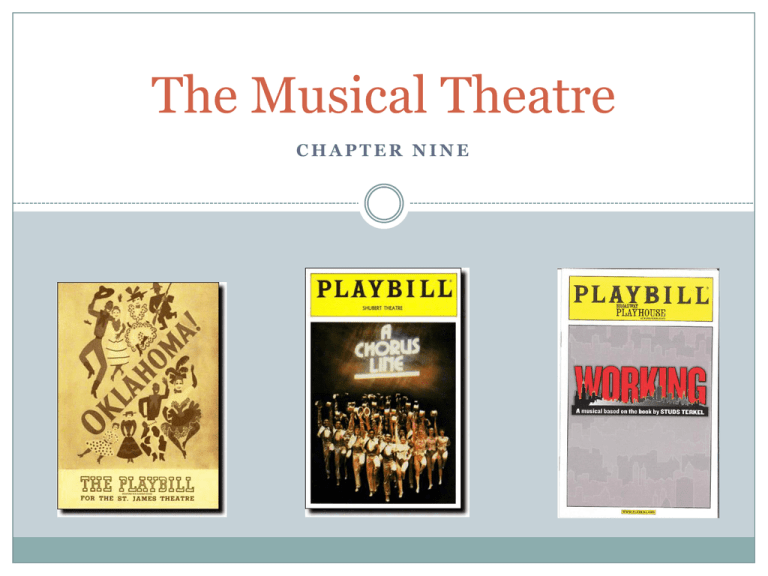
The Musical Theatre CHAPTER NINE Music theatre is antirealistic & presentational All drama has always been partly musical Classic Greek drama was sung and danced Most renaissance performances were accompanied by songs and instrumental music Shakespeare’s 38 plays contain singing...THE TEMPEST has nine songs 17th century comedies regularly ended with a dance Musical masques evolved over time into ballet and opera Asian forms of theatre involve singing, dancing and instrumental music Still, musical theatre is widely regarded as a genre into itself for the past 150 years Broadway musicals dominate NY box offices and NYC remains the international center of musical theatre THE FANTASTICKS Opened in 1960 Ran for 42 years Closed in 2002 17,162 performances Reopened in 2006 Pulitzer Prize Award-winners Of Thee I Sing, 1932 South Pacific, 1950 Fiorello!, 1960 How to Succeed in Business Without Really Trying, 1962 A Chorus Line, 1976 Sunday in the Park With George, 1985 Rent, 1996 Next to Normal, 2010 European influences of the musical include Classical Greek Theatre Greek Theatre’s were like modern sports stadiums Greco-Roman Theatre Shakespeare’s stage Court of Louis XIV Minuet at Court Royal Ballet Lully’s Ballet at French court Commedia dell’ Arte – Italian renaissance Size and spectacle in 18th Century Playhouse 19th Century German Opera House Russian Ballet at turn of 20th century Influences on the American musical RENT Extravaganza Niblo’s Garden, 1860 Niblo’s Garden produced “first” musical The Extravagant Revue Minstrelsy Slayton Jubilee Singers Christy’s Minstrels Jazz Dance Vaudeville Variety Acts Burlesque Comic Opera OPERETTA Musical Comedy Irving Berlin’s “The Cocoanuts” No, No Nanette Rodgers and Hart Cole Porter Show Boat (1927) by Jerome Kern George and Ira Gershwin PORGY AND BESS Rodgers and Hammerstein with Irving Berlin Broadway’s Golden Age Show Boat, 1927 Of Thee I Sing, 1932 Porgy and Bess, 1935 Pal Joey, 1940 Oklahoma! - 1943 Agnes DeMille Legacy of R&H Memorable MUSICALS from the Golden Age Irving Berlin’s ANNIE GET YOUR GUN (1946) Cole Porter’s KISS ME KATE (1948) Frank Loesser, GUYS AND DOLLS (1950) Adler and Ross, DAMN YANKEES (1955) Leonard Bernstein’s WEST SIDE STORY (1957) Meredith Willson’s THE MUSIC MAN (1957) Jule Styne’s GYPSY (1959) Charles Strouse BYE, BYE BIRDIE (1960) Lerner and Leowe, MY FAIR LADY (1964) Bock and Harnick’s FIDDLER ON THE ROOF (1964) Michael Bennett’s A CHORUS LINE (1974) Stephen Schwartz CREDITS Butterflies Are Free Godspell Mass Pippin The Magic Show The Baker’s Wife Working Rags Children of Eden Pocahantas (film) Hunchback of Notre Dame (film) Prince of Egypt (film) Wicked Enchanted (film) Snapshots Séance on a Wet Afternoon Houdini (in process) The Contemporary Musical In its heyday, the broadway musical was a star-maker: Jimmy Durante, Eddie Cantor, Mary Martin, Ethel Merman, Julie Andrews, Carol Channing, Pearl Bailey, Bob Hope, John Raitt are examples As film and television became more popular, the golden age of the musical came to an end. During the 70s and 80s, a new artist emerged...the Choreographer-Director Jerome Robbins (1918-1998) Gower Champion (1921-1980) Bob Fosse (1927-1987) Tommy Tune (born 1939) Michael Bennett (1943-1987) Susan Stroman Today’s pre-eminent Director-Choreographer Credits include Crazy for You (1992) Show Boat (revival) 1995 Big (1996) Steel Pier (1997) Oklahoma! (revival) 1999 Contact (2000) The Music Man (revival) 2000 The Producers (2001) Young Frankenstein (2007) The Scottsboro Boys (2010) Big Fish (2013) Dress rehearsal – THE PRODUCERS Production shot – THE PRODUCERS Susan Stroman credits Contact The Producers The Scottsboro Boys BIG FISH Other Recent Credits Stephen Sondheim (born 1930) Company (1970) The Rock Musical The British Invasion Jesus Christ Superstar Cats Phantom of the Opera Les Misérables Miss Saigon Mamma Mia Two men led the British Invasion Andrew Lloyd Webber Cameron Mackintosh Joseph and the Amazing Technicolor Dreamcoat Cult Musicals Musicals of the 21st Century Musicals – A “How to” Music Composer writes the music Arranger prepares for performance Music director prepares music for performance Lyricist writes the lyrics Stephen Sondheim writes both music and lyrics Cole Porter also wrote both music and lyrics Musical Score Pit Orchestra – THE PRODUCERS The Lyrics of Stephen Sondheim A Little Priest (from “Sweeney Todd”) TODD: (spoken) These are desperate times, Mrs. Lovett, and desperate measures are called for! LOVETT: Here we are, now! Hot out of the oven! TODD: What is that? LOVETT: It's priest. Have a little priest. TODD: Is it really good? A Little Priest (continued) LOVETT: Sir, it's too good, at least! Then again, they don't commit sins of the flesh, So it's pretty fresh. TODD: Awful lot of fat. LOVETT: Only where it sat. TODD: Haven't you got poet, or something like that? LOVETT: No, y'see, the trouble with poet is 'Ow do you know it's deceased? Try the priest! The Book of a Musical What is "The Book"? The book – also called the libretto – is the least appreciated and yet most dramatically important element of a musical. It is the narrative structure that keeps the score from being nothing more than a disjointed medley of songs. For many years, the main point of most shows was to showcase a score and/or a major star. As a result, the books of most Broadway musicals were a series of scenes, jokes and sight gags designed to get from song to song. By the 1940s, audiences were ready for something more, and shows like Pal Joey and Oklahoma! made it imperative that the book and score interweave to tell a cohesive story. This made for a much more satisfying kind of theatrical entertainment. After all, the first job of every play or film – musical or not – is to tell a good story. Rehearsal studio Albert Taylor Hall ESU Theatre presents WORKING October 16-19 2014 Albert Taylor Hall
